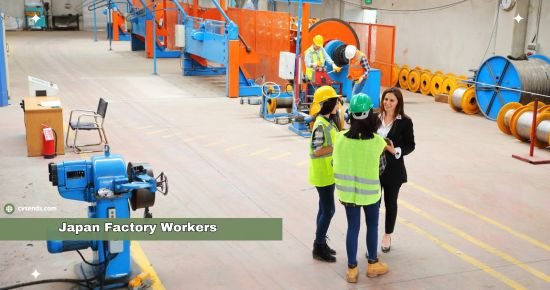Japan Factory Workers. Japan has a technology industry, a world-reading manufacturing process, and an impressive work ethic. In the earning of the good reputation is the factory working force, which is instrumental in making Japan a global industry leader from electronic to automotive factory work in Japan, playing an important role in maintaining the production level and making sure eye quality goods are manufactured in this. In the article, we will explore the requirements benefits, and skills needed for factory workers in Japan.
Factory workers in Japan are involved in the area of industry, from electronics and automotive to full production and textile. The demand for skilled labor in the sector is very high. These factories are an essential part of Japan’s economic infrastructure. These workers are tasked with ensuring the smooth operational manufacturing process, monitoring equipment assembling the products, and meeting productivity targets. Japanese factory workers typically work in large and high-technology factories where automation and robotics are increasingly prevalent. But the human workers are still important to quality control maintaining machinery troubleshooting problems and assembling the parts that are needed and necessary for the human touch. Workers in smaller factories are those with more specialized industries. Are also have a broad range of duties, which include packaging, inspecting products, and handling materials.
Requirements for Japan Factory Workers
Education and qualifications
Mostly, factory worker jobs in Japan do not require any advanced academic qualification, but a school diploma is very expected. Many are currently after the completion of secondary education with some additional training. In certain fields such as electronic or automotive manufacturing, the most specialized technical education is required Manufacturing Japan provides job training when you apply or introduce yourself to the process machinery and quality standards of the factory. This is hands-on training in invariable but it is making sure that employer will prepare and handle the specialized requirements of their roles. For highly technical fields such as engineering or machinery maintenance, a degree, and a relevant subject, live mechanical engineering or industrial automation is necessary Workers can have more advanced responsibilities like the old same production line or developing maintenance schedules.
Language proficiency
It is possible to work in Ja Japanese factory without knowing the Japanese. But efficiency language is very highly recommended, especially for long-term employment. Many companies require basic Japanese language ski skills to ensure workers can follow instructions. All Sudan understand safety guidelines and communicate effectively with supervisors and colleagues. Japanese language proficiency and efficiency are very important for workers who will be involved in roles that require interaction with quality control teams or management. Fluency in Japanese can be an asset for those aiming to rise through the ranking with the company.

Working permit and visa
Further foreigners national vision of work in Japanese factories, also planning a working permit or visa is very important and necessary. Japan has several resumptions for worker industries like manufacturing, including the specified skilled worker visa, which is along with the foreign worker with specific expertise to fill the labor gap in sectors like construction and manufacturing. The visa process is the applicant meeting certain requirements, which are working experience, language, proficiency, and healthcare standards, the foreign worker is also expecting the Japanese labor law, which includes the regulation of working hours, wages, and health and safety standard.s
Physical fitness in stamina
Japan can be physically demanding, especially in sectors, like construction, food production, and automatic assembly. The working man involved a longer reputative task and standing for extended periods. Some jobs also require lifting heavy materials or working in noisy environments. Employers are generally provided the economic sport and safety training to help the plantworkg However the worker should be physically prepared for the remainder of the job.
Benefits of working in Japan
Competitive salary.
Japan generally earns a competitive salary. Livages can vary depending on the industry, location, and skill level. In general defective workers in Japan, receive salaries, that are above the average in many countries. According to your data from the various labor sources, the average annual salary for the factory worker in Japan is very high. It depends on the type of work, experience, and level of responsibility. In addition to the base, certainly, the manufacturer also receives performance-based bonuses, particularly during the year-end. The Japanese government also imposes regulations to make sure that the workers are paying fair wages. Including overtime pay and guaranteed minimum wage.
Comprehensive benefit packages
This plan provides access to a wide range of medical services at a fraction of the cost, which can. Be paying in other countries.
The pension system in Japan is enrolling the national pension system, which provides a retirement benefit. This system is necessary and mental to make sure that employers can receive a pension when they retire provided they have paid into a system for a sufficient number of years.
Paid vacations journey labella is mandatory that the employer received vacation days, typically starting at 10 days per year, with more than added based on the year of service.
Jobs stability
Fat people in Japan are after the hyde area of job stability, especially in large and well-established companies. Many companies off permanently-time contracts, which provide job security and access to long-term benefits such as pensions, and health care insurance. In addition, Japan has an aging population and the shortage of labor in certain industries means that manufacturers are eager to hire and retain skilled workers. Especially in robotics, manufacturing, and electronics.
How to Apply
First of all, you should understand the visa requirements and visa type On the other hand, you can find job opportunities in Japan. Then visit the company websites and networking and direct applications Then prepare your application CV and resume. Attach a cover letter and documents, then submit it in the company’s profile Then prepare for interviews and the selection process. Then join the job on the appointment And you should take the training.

